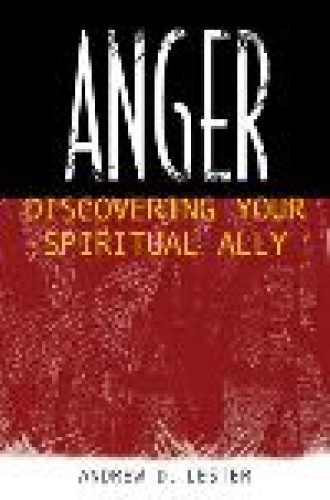Anger: Developing Your Spiritual Ally/Holy Anger: Jacob, Job, Jesus
In Anger: Your Spiritual Ally, Andrew Lester, emeritus professor of pastoral theology and counseling at Brite Divinity School, tries to unhook us from a relationship to anger that is all too common and with which he grew up: “I was carefully taught to ‘be nice,’ and it was clear that being nice meant not expressing anger. As a result, I grew up afraid of anger and uncomfortable around conflict.” Many churches collude in such unhelpful teaching. In our anxious times it may be that people increasingly imagine that a church should provide a refuge from conflict—should be a gathering where everyone is unfailingly nice. Yet when congregations and their members are unable to have conflicts and resolve them openly, their lives tend to be superficial and drained of energy.
Contending that anger is part of our God-given makeup, part of the creation God called good, Lester develops what he calls “the threat model” for understanding anger. In short, anger is a response to a threat—sometimes a physical threat, but most often a psychological one. He writes that when we are angry, we should ask, “What are all the possible threats that I am feeling in this situation?” This exercise is especially valuable at a time when political and religious figures often manipulate anxiety and fear in order to gain power and influence, whether the threats they allude to are real or not.
Drawing on scriptures from Genesis to the Pauline epistles, Lester suggests a complex approach to anger. He asks whether Jesus got angry, discusses ways to deal with anger creatively, and lays out a six-step process that includes “evaluating the validity of the threat” and “communicating anger appropriately.” He also explores the destructive potential of anger, but points out that if anger can destroy, so too can the repression of anger. “We can lose our best self in many ways,” observes Lester. “Unjust, unfair, or controlling relationships, for example, can cause people to lose their sense of self and sense of worth.” When we understand and own our anger, on the other hand, we can regain—or discover for the first time—our best selves.
Among the many helpful ideas in this book, Lester saves one of the best for last: the idea that anger may serve as an “idol detector.” Anything—from our work to sports teams to our children—can become idols or false gods, and when such false gods are threatened we can become angry. When we ask ourselves what threats we feel when we are angry, anger is a diagnostic tool that can help us identify our idols. When we are being thoughtful and faithful, we can interrogate our anger to make sure that it is in the service of a worthy cause and not an idol.
Lytta Basset’s Holy Anger: Jacob, Job, Jesus offers little of the sort of step-by-step analysis and strategies that make Lester’s book a great candidate for an adult study group. Nevertheless, her careful and sustained circling around a limited number of key biblical narratives is a deep and rich journey, made in the company not only of scripture but of philosophy and psychoanalysis as well. Philosophers René Girard and Paul Ricoeur are dialogue partners, as are writers like Elie Wiesel and Albert Camus. And whereas Lester reflects primarily on anger in human relationships, Basset’s study directs us toward the place of anger in our relationship with God.
One of the narratives Basset takes up is the Bible’s primal episode of anger, the story of Cain. It’s not easy to know why God rejected Cain’s offering, though many theories have been advanced. In line with her belief that anger is an invitation to the deepest engagement with self and other, Basset, a professor of theology in Lausanne, Switzerland, argues that Cain’s offering was rejected not because God rejected Cain’s existence, but because God rejected Cain’s nonexistence. Revealing her psychoanalytic bent, Basset portrays Cain as someone accommodated to an overbearing mother. His sin was that he did not fully engage. He hadn’t really shown up.
In our own hurried and anxious lives, we may be more like Cain than we imagine. That is, we are not fully present but are caught in a numbed and distracted nonexistence. Too often busyness becomes a way of avoiding issues. We may use drugs to smooth ourselves out. We may invoke God’s name while avoiding God’s presence. All of this might aid our social functioning, but it will not serve our deeply human functioning. God rejects our half-lived lives, our bartered offering of ourselves, just as God rejected Cain’s offering.
The anger that ensued when God rejected Cain is an invitation to confrontation with God, who is capable of dealing with our anger. “It has to ‘heat up’ between us and the OTHER so that we can access the indestructible fire in ourselves and perceive that it burns in the other human as well. For Jacob, as for Cain, it is first the divine OTHER who makes himself an outlet for the human’s anger.” Basset relates an anecdote from the deathbed of Georges Bernanos, author of the classic Diary of a Country Priest. After Bernanos asked his friends to withdraw, they heard him murmur, “Now it’s just the two of us.”
The implication of this line of argument is that a faith in God that does not permit anger, and specifically anger before God, ceases to be a truly vital, impassioned faith. Thus the heroes of Basset’s study are those who go to the mat with God: Jacob and Job. Or perhaps God is the real hero. Basset notes that “anger is one of the most frequently mentioned divine emotions in the Hebrew Bible, making it much more a feature of God than human beings.” A Hebrew word translated as anger is used “170 times with reference to God, but only 40 times with reference to a human.” God does not censure God’s anger, nor, Basset implies, ought we. That is not to say, of course, that we should express our anger in violent behaviors that destroy others or are self-destructive. Anger is both a summons to confrontation and a source of power for such engagement. Moreover, “The cutting word of the Gospel invites us to welcome the times of conflict and crisis not as a calamity but as the painful time of birth.”
I happened to be reading Basset’s elegant meditations at a time when a Unity Church minister in the Midwest was starting a movement in which people take a vow to abstain from all complaining. This had caught on so well that he was swamped with orders for the program’s obligatory wristband and had even appeared on Oprah. To this I juxtaposed Basset’s message: “The first obstacle to the divine relational life within us and among us—to the reign of God as the texts put it—is this censorship of complaint which, while leaving the wound intact, prevents healing and poisons all relationships.”
A religious writer has to have a certain amount of gumption to take on anger at a time when some people argue that religion and violence go hand in hand. More than that, it takes courage to offer more subtle explorations of anger at a time when a frequent response to anxiety and perceived threat is to censure the negative and embrace the positive, as if saying only nice words will make them come true. Because that won’t work, and because we are tempted to drive anger and its cousins even more deeply underground in these anxious times, these two books are urgent and important.






